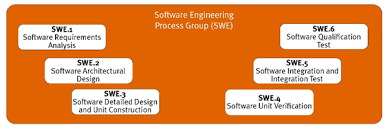The Essential Role of a Software Engineer (SWE) in Modern Technology
The Role of a Software Engineer (SWE)
Software engineers, often referred to as SWEs, play a crucial role in the development and maintenance of software applications. They are responsible for designing, coding, testing, and debugging programs that enable various digital functionalities.
Skills Required
Successful software engineers possess a strong foundation in programming languages such as Java, C++, Python, or JavaScript. They also need to have a deep understanding of algorithms, data structures, and software design principles.
Responsibilities
Software engineers collaborate with cross-functional teams to analyze user needs and develop software solutions that meet those requirements. They are involved in all stages of the software development lifecycle, from planning and design to implementation and deployment.
Challenges
One of the key challenges faced by software engineers is staying updated with rapidly evolving technologies. Continuous learning and adaptation are essential in this dynamic field to ensure that SWEs can deliver cutting-edge solutions.
Career Opportunities
The demand for skilled software engineers is high across various industries, including tech companies, financial institutions, healthcare organizations, and more. With experience and expertise, SWEs can advance their careers into roles such as technical lead, software architect, or project manager.
Conclusion
In today’s digital age, software engineers play a vital role in shaping the technological landscape. Their innovative solutions drive progress and enable businesses to thrive in an increasingly competitive market. As technology continues to evolve, the role of a software engineer remains indispensable in creating efficient and user-friendly software applications.
Top 9 Frequently Asked Questions About Software Engineering Careers
- What is a Software Engineer (SWE)?
- What are the key responsibilities of a Software Engineer?
- What programming languages should a Software Engineer know?
- How does one become a successful Software Engineer?
- What are the typical skills required for a Software Engineer role?
- What career opportunities are available for Software Engineers?
- What challenges do Software Engineers commonly face in their work?
- Is a degree in Computer Science necessary to become a Software Engineer?
- How can software engineers stay updated with the latest technologies and trends?
What is a Software Engineer (SWE)?
A Software Engineer (SWE) is a professional responsible for designing, developing, and maintaining software applications. SWEs utilize their expertise in programming languages, algorithms, and software design principles to create efficient and functional solutions that meet user needs. They work collaboratively with cross-functional teams throughout the software development lifecycle to ensure the successful implementation of projects. SWEs play a crucial role in advancing technology and driving innovation across various industries by creating cutting-edge software solutions that enhance digital experiences.
What are the key responsibilities of a Software Engineer?
Software engineers are tasked with a variety of key responsibilities that are essential to the development and maintenance of software applications. Some of the primary duties include collaborating with cross-functional teams to analyze user requirements, designing and implementing software solutions that meet those needs, testing and debugging code to ensure functionality and reliability, as well as continuously updating and improving existing software systems. Additionally, software engineers are responsible for staying abreast of industry trends and advancements to incorporate the latest technologies into their work, ultimately contributing to the overall success of projects and the efficiency of digital solutions.
What programming languages should a Software Engineer know?
When considering the question of what programming languages a Software Engineer should know, it is important to understand that the choice of languages can vary depending on the specific industry, project requirements, and personal career goals. However, some commonly recommended programming languages for Software Engineers include Java, C++, Python, JavaScript, and SQL. These languages are widely used in different domains and offer versatility in developing various types of software applications. Additionally, having a solid understanding of algorithms and data structures is essential regardless of the programming language used, as they form the foundation for efficient and scalable software solutions. Ultimately, staying adaptable and continuously learning new languages and technologies can help Software Engineers stay competitive in the ever-evolving tech industry.
How does one become a successful Software Engineer?
To become a successful Software Engineer, individuals need to acquire a strong foundation in programming languages, algorithms, and software design principles. Continuous learning and staying updated with the latest technologies are essential in this fast-paced field. Practical experience through internships, personal projects, and collaboration with peers can also enhance one’s skills. Developing problem-solving abilities, effective communication skills, and a passion for innovation are key traits that contribute to success in the software engineering profession. Embracing challenges, seeking feedback, and being open to continuous improvement are crucial aspects of a successful software engineer’s journey.
What are the typical skills required for a Software Engineer role?
In the realm of Software Engineering, a commonly asked question revolves around the essential skills required for this role. A Software Engineer must possess a strong proficiency in programming languages such as Java, C++, Python, or JavaScript. Additionally, a deep understanding of algorithms, data structures, and software design principles is crucial for success in this field. Effective problem-solving abilities, attention to detail, and the capacity to work collaboratively within cross-functional teams are also highly valued skills that enable Software Engineers to excel in their roles.
What career opportunities are available for Software Engineers?
Software Engineers have a wide range of career opportunities available to them across various industries. They can pursue roles such as software developer, systems analyst, quality assurance engineer, technical lead, software architect, project manager, and more. With their expertise in programming languages and software development methodologies, Software Engineers are highly sought after by tech companies, financial institutions, healthcare organizations, government agencies, and other sectors that rely on digital solutions. The demand for skilled Software Engineers continues to grow as technology advances, offering ample opportunities for career growth and specialization in the ever-evolving field of software engineering.
What challenges do Software Engineers commonly face in their work?
Software Engineers commonly face various challenges in their work, including staying abreast of rapidly advancing technologies, managing complex project requirements, and troubleshooting intricate technical issues. Keeping up with the latest trends and tools in the ever-evolving tech landscape is crucial for SWEs to deliver innovative solutions. Additionally, balancing time constraints and meeting project deadlines while maintaining code quality can be a significant challenge. Problem-solving skills and effective communication within cross-functional teams are essential for Software Engineers to overcome these obstacles and ensure the successful development of software applications.
Is a degree in Computer Science necessary to become a Software Engineer?
Many aspiring individuals often wonder if a degree in Computer Science is essential to pursue a career as a Software Engineer. While a Computer Science degree can provide a solid foundation in programming languages, algorithms, and software development principles, it is not always a strict requirement. Many successful Software Engineers have backgrounds in related fields or have gained expertise through self-study and practical experience. However, having a degree in Computer Science can offer advantages in terms of structured learning and credibility in the eyes of employers. Ultimately, what matters most in this field is the individual’s proficiency in coding, problem-solving skills, and continuous learning mindset rather than the specific degree they hold.
How can software engineers stay updated with the latest technologies and trends?
To stay updated with the latest technologies and trends, software engineers can engage in continuous learning through various channels. This includes attending industry conferences, participating in workshops and webinars, enrolling in online courses, reading tech blogs and publications, joining professional forums and communities, and following influential figures in the field on social media platforms. Additionally, collaborating with colleagues on projects, experimenting with new tools and technologies in personal projects, and seeking mentorship from experienced professionals can also help software engineers stay abreast of advancements in the ever-evolving tech landscape. By actively pursuing learning opportunities and staying curious about emerging technologies, software engineers can enhance their skills and remain competitive in the industry.




